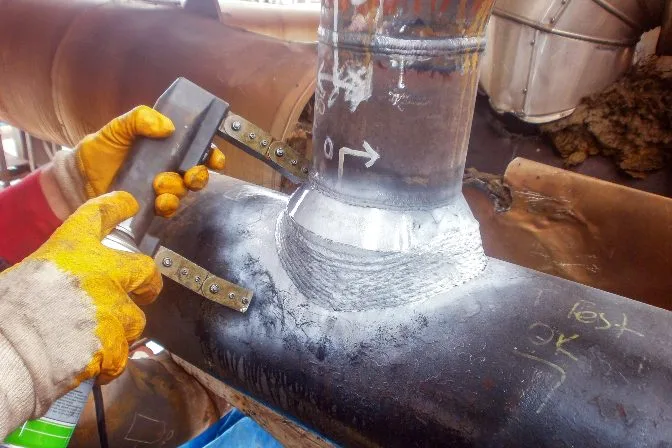Maximize Your Welding Top Quality with Expert Inspection Services in Gilbert Arizona
Maximize Your Welding Top Quality with Expert Inspection Services in Gilbert Arizona
Blog Article
The Impact of Rigorous Welding Evaluation on Market Specifications: Encouraging Security, Dependability, and Compliance Throughout Numerous Markets
The duty of rigorous welding evaluation is increasingly recognized as an essential element in enhancing market criteria, where integrity, compliance, and safety take precedence throughout diverse sectors. What transformations might we prepare for in welding methodologies as the need for quality and security magnifies?
Significance of Welding Evaluations
Recognizing the critical function of welding assessments in keeping high quality and safety requirements, market professionals focus on these evaluations to make certain structural honesty. Welding assessments function as a crucial checkpoint in the fabrication process, determining defects that might compromise the resilience and safety of bonded structures. By systematically assessing welds, inspectors can spot concerns such as insufficient infiltration, porosity, and fractures, which might not be noticeable to the naked eye.
The relevance of these examinations prolongs beyond mere conformity; they are vital for guarding lives and securing financial investments. In crucial markets such as production, aerospace, and building, a solitary faulty weld can bring about devastating failings, causing both financial loss and human casualties. Consequently, carrying out rigorous assessment procedures mitigates these threats and improves overall project reliability.
In addition, constant welding assessments foster a society of top quality throughout organizations, motivating welders to stick to finest techniques and preserve high criteria in their work. This commitment to top quality not only enhances functional efficiency however likewise reinforces the credibility of firms within their respective fields. Thus, welding evaluations are crucial in advertising safety, integrity, and compliance throughout numerous markets.
Trick Market Standards and Rules
The structure of welding examinations is underpinned by a robust collection of industry criteria and policies that regulate practices throughout numerous sectors. Trick establishments, such as the American Welding Culture (AWS) and the International Organization for Standardization (ISO), establish standards that ensure top quality and security in welding operations. As an example, AWS D1.1 outlines crucial requirements for welding steel structures, while ISO 3834 defines quality needs for fusion welding.
Along with these particular requirements, market regulations like the American National Standards Institute (ANSI) and Occupational Safety And Security and Health And Wellness Administration (OSHA) requireds even more boost compliance by establishing safety methods and functional best practices. These guidelines are critical in sectors such as production, building and construction, and aerospace, where welding stability is paramount.
Moreover, sector-specific standards, such as those from the American Culture of Mechanical Engineers (ASME) for pressure vessels, give additional layers of scrutiny to ensure that welds fulfill rigid safety and security and performance criteria. Adherence to these requirements not just promotes governing compliance however likewise cultivates a culture of top quality and reliability across the welding industry, eventually securing public well-being and improving functional effectiveness.

Advantages of Conformity and Reliability
Consistently adhering to industry requirements and guidelines in welding examinations yields considerable benefits, improving general integrity and performance. The foremost benefit is the assurance of quality in bonded joints, which straight adds to the safety of frameworks and equipment. Conformity with well-known criteria lessens the threat of failure and tragic incidents, consequently protecting both human life and valuable possessions.
Moreover, companies that focus on strenuous welding assessments cultivate a culture of liability and professionalism. This commitment not just bolsters the credibility of the business however likewise infuses confidence in stakeholders and clients relating to the stability of items and services. Trustworthy welding processes lead to decreased expenses connected with rework, repair work, and prospective lawful responsibilities coming from poor handiwork.
Additionally, maintaining compliance with industry criteria assists in smoother regulatory communications, as organizations can conveniently show adherence to required procedures (Welding Inspection Gilbert Arizona). This aggressive method can result in useful partnerships and opportunities within the sector, as well as accessibility to new markets
Obstacles in Welding Inspection
Browsing the complexities of welding inspection provides a myriad of difficulties that can prevent conformity with industry standards. One substantial barrier is the variability in evaluation methods and technologies. Various industries might use varied techniques, leading to disparities in the assessment of weld high quality. Furthermore, the lack of standard training for assessors can lead to varied interpretations of inspection requirements, which might compromise security and dependability.
One more challenge hinges on the access of innovative inspection tools - Welding Inspection Gilbert Arizona. While technologies such as ultrasonic screening and radiography can boost discovery abilities, their implementation may be restricted by expense or accessibility, particularly in smaller sized operations. This difference can cause a dependence on less efficient evaluation techniques, boosting the risk of undetected flaws
Furthermore, the busy nature of modern production often pressures assessors to prioritize speed over thoroughness, possibly ignoring crucial flaws. Regulative compliance can be discouraging page due to the developing nature of sector requirements, leaving organizations struggling to maintain up with the most recent requirements. These obstacles require continuous enhancement in examination methods to ensure the honesty of bonded structures across various fields.
Future Trends in Welding Practices
Emerging modern technologies and evolving methods are readied to change welding techniques in the coming years. Improvements in automation, such as robot welding systems, are obtaining grip, boosting precision and efficiency while lessening human mistake. These systems will not just quicken manufacturing yet additionally promote constant quality assurance, dealing with a few of the difficulties dealt with in hands-on welding.
Furthermore, the combination of expert system (AI) and equipment knowing right into welding processes is positioned to change examination and monitoring. Real-time information analytics will make it possible for anticipating maintenance, enabling for aggressive treatments that reduce downtime and increase safety and security. In addition, increased truth (AR) and online fact (VIRTUAL REALITY) technologies are becoming important in training welders, providing immersive experiences that improve ability growth without the risks related to traditional techniques.
Sustainability is additionally a crucial fad, as markets seek greener practices. The adoption of environmentally friendly products and approaches, together with energy-efficient equipment, will likely come to be standard. As sectors adjust to these modifications, the emphasis will change towards greater conformity with security and ecological guidelines, guaranteeing that welding practices not only meet current criteria however also pave the way pop over to this web-site for a safer and even more sustainable future.

Verdict
In conclusion, extensive welding inspections significantly enhance market criteria by making certain security, dependability, and compliance across different markets. As markets continue to focus on operational stability, the importance of thorough examinations will just boost, eventually benefiting businesses and culture at big.
The duty of rigorous welding inspection is increasingly recognized as an important part in boosting industry requirements, where integrity, safety and security, and conformity take precedence across diverse industries. Therefore, welding assessments are vital in promoting security, integrity, and conformity throughout different sectors.
Trick establishments, such as the American Welding Culture (AWS) and the International Organization for Standardization (ISO), develop guidelines that guarantee high quality and safety and security in welding procedures. AWS D1.1 describes vital requirements for welding steel frameworks, while ISO 3834 specifies high quality demands for combination welding.
In final thought, rigorous welding my explanation assessments dramatically enhance market standards by guaranteeing security, integrity, and compliance throughout different markets.
Report this page